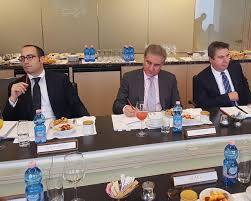Pakistan FM participates in UfC hosted by Italy’s counterpart on UNSC reforms

Islamabad: Foreign Minister Shah Mehmood Qureshi Monday participated in the annual Ministerial meeting of the “Uniting for Consensus (UfC),” hosted by the Italian Foreign Minister Luigi Di Maio in a virtual format.
Addressing the participants live, the Foreign Minister laid out a five-point proposal for advancing the UfC’s shared priorities for reforming the UN Security Council. He reaffirmed that Pakistan will continue to promote a comprehensive reform of the Security Council in order to make it a more democratic, representative, accountable, transparent and efficient body.
The Foreign Minister rejected attempts by some countries to exploit the UN reform process for advancing their narrow national ambitions, including their self-arrogated claims to permanent seats on the Security Council. He stressed that, in accordance with the decisions of the UN General Assembly, “we must continue the effort to promote a solution which enjoys the ‘widest possible political acceptance’ of all member states.”
The Foreign Minister also stated that the UfC’s position “is simple, logical and straightforward. It is the only practical solution to the reform of the Council.”
The UfC group meets annually at the level of Foreign Ministers on the sidelines of UN General Assembly sessions. The UfC member countries share a common and principled stance on the vital and strategic issue of UN Security Council reform.They once again expressed their shared perspectives and reaffirmed the common position at the meeting.
A Joint Statement was released to the Press on behalf of UfC at the conclusion of the meeting. The full text is reproduced below:
Ministers of the Countries belonging to the “Uniting for Consensus” Group held a virtual meeting today to assess the state of the UN Security Council reform process.
While profoundly impacted by the tragic Covid-19 pandemic that allowed only two meetings to take place, the last Intergovernmental Negotiations on the reform of the Security Council confirmed the commitment of the membership to the reform process. At the same time it showed the persistence of diverging views on key aspects of reform, such as the veto and the categories of membership.
Strongly committed to reaching a consensual solution to this longstanding issue, UfC Ministers reaffirmed that the IGN remains the sole legitimate setting for discussion on Security Council reform, in full transparency and with the participation of all UN Member States.
In this sense, UfC Ministers reiterated the need and the urgency for the UN membership to agree on a reform model capable of making the future, expanded Security Council more democratic, accountable, representative, transparent and effective: a reformed Security Council whose increased legitimacy to the membership and to the public would nurture trust in the United Nations and strengthen multilateralism.
UfC Ministers therefore called upon all Member States to continue to engage constructively in seeking a fair and equitable compromise solution that meets the collective interest of all 193 Members of the UN, garnering the widest possible political support from the membership.
Consistent with their approach, the UfC Ministers agreed to continue working to support the aspirations of African countries for a more equitable representation of their Continent in a reformed Security Council, as well as the aspirations of other developing Regions, of small States and SIDS.
UfC Ministers confirmed their opposition to enlarging the Security Council to new permanent members: an effective and democratic Security Council cannot be reformed by the addition of new members with exclusive national rights and unequal privileges.
Encouraged by the growing understanding of their approach, the UfC Ministers reaffirmed their full commitment to engage in good faith in constructive discussions with all the Member States in order to achieve an effective UN reform to the benefit to the whole UN membership.





